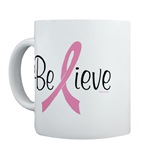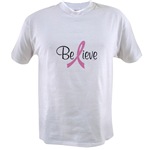You got it. Hungry? How about a Pink Ribbon Bagel from Panera Bread?

Which organizations benefit from this mass consumption of pinkness? Well, for one, the Susan G. Komen Breast Cancer Foundation benefits in many cases and has been dubbed “the 800-pound gorilla of cause marketing” in a 2004 Seattle Weekly column. And lest you forget dear gentle readers, this is as much about marketing as it is about breast cancer.

My favorite non-profit breast cancer charity, www.breastcancer.org, is dedicated to giving those of us affected by breast cancer the best and most up-to-date information and support. It pulled me through many a late night/early morning anxiety attack. So, I can honestly recommend it without reservations.

As a CafePress shop owner, I created a pink ribbon design that is featured in this month’s Breast Cancer Donation Shop (click here to see products featuring my design). I don’t get a dime but CafePress.com will donate 40% of the retail price of all products sold through the Breast Cancer Donation Shop through October 31, 2006 to the Susan G. Komen Breast Cancer Foundation or another non-profit 501(c)(3) organization with a core purpose of raising awareness and funding breast cancer research and education.
8 comments:
Great Blog! I found your blog through a comment you left on another blog listed on the Montgomery Advertiser's website.
I'm glad I visited your blog as I find it very fun to read.
Keep up the great job!
Andrew
Welcome Andrew, and come see me any time you can afford a few extra moments. Of late I have been too serious. I gonna post on something fun and trivial tomorrow. Life's too short not to laugh.
I've gotten quite a few visits via the Montgomery Advertiser forum and think since they've changed the format a few lost soles are looking for a home. I love to hear from readers and always post responses unless someone is selling something or impolite (which no one has been yet). Maybe I need to be more "Ann Coulter."
It's late and I worked all day at the Alabama National Fair. And I just realized I spelled souls as soles. Silly me. Can I blame it on chemo brain? Old age? Or I'm tired. Oh well bed calls.
Julia, thanks. I read the article. While I never set out to make my blog a "cancer" blog, I'm finding myself writing about it more than I intended. Ehrenreich reflects many of my sentiments. In fact, she is such a good writer that I'd be foolish to attempt to make the same points because I am not.
I have a love/hate relationship with the pink ribbon and all that it symbolizes. The design I created was my concession to those for whom the ribbon gives hope. I only wish the proceeds from sales would go to www.breastcancer.org rather than the mega-"charity" Susan G. Komen Foundation which has to be a model of an organization marketing itself. If the corporations that tie-in their products to breast cancer were so generous, why don't they give all of the proceeds to "the cause?"
That said, I don't wear the "pink ribbon" or buy pink. Why? I feel much as Ehrenreich does. I don't call myself a "survivor" because we (humans) are all survivors until the day we die. I say, "I am a woman who had a bout with breast cancer." But my true sentiments are gleaned from my poor attempt at "poetry" which I wrote last October during the pink blight. "Pretty pink ribbons are meant for little girls. Place them in your hair. Not upon your chest. Wear no pretty pink ribbons for a nasty thief who robs you while you are baking a cake or bathing the baby."
I, too, wish we could focus on the why and not the what do we do afterwards as is so often the case with American medicine. By this I mean what causes breast cancer, not how should it best be treated. Of course, I'd be silly if I didn't say this is important too. But the real cure will come when we explore more thoroughly the environmental and hormonal connections. Fueled by profit-driven corporations, research is sometimes skewed in a direction that might not always be the wisest.
Ehrenreich pretty much said nothing that I didn't experience. She is painfully honest. I was instructed by several "survivors" with the kindest intentions to "think positive." I was afraid that if I had angry thoughts and felt too sorry for myself, I'd be fueling the cancer. I thought, "Hey, they are still alive. Maybe, they're right."
But, I gradually found my way. I'm at a good place today. I rarely obsess. I see the pinkness with a blinder of sorts. It's there. If it brings comfort and hope to some, so be it. We must each find what works for us. For me, it's art, writing, seeing my family grow and hit milestones like marriage and high school graduation.
Again, Julia. Thank you for stopping by. I am sorry you lost your dear husband, but your work is a tribute to his memory.
Hi, Sheila:
I was so happy to see your answer to my posting about the “think pink” phenomenon. Thanks, too, for your comments about my losing my husband. I am very touched.
I went on the breastcancer.org site to check it out. I am glad it was such a lifesaver for you when you had cancer. But one thing that bothers me about it, and about all the other “official” cancer organizations, is the fact that all the people connected with it are totally conventional medical people.
I found one comment in your answer to me especially interesting – and true. You wrote: “But the real cure will come when we explore more thoroughly the environmental and hormonal connections. Fueled by profit-driven corporations, research is sometimes skewed in a direction that might not always be the wisest.”
Along this line, I am sure it will not surprise you to know that in countries that have huge ties to the pharmaceutical industry (like America), chemotherapy, radiation and surgery are the primary cancer treatments. In fact, if patients and doctors opt to use treatments other than the “conventional,” they are often vilified. (An example: the recent case of Abraham Cherrix, who opted NOT to have chemotherapy, and was almost forced to take it. In addition, he was almost taken away from his patents, who supported his choice. Luckily, the Cherrixes won in the end. Whichever way it turns out -– i.e., whether he lives or dies -- I think it is crucial that we control our own health care decisions. The judge finally agreed.)
I would be honored if you would take a look at several of my other links on my site, www.honestmedicine.com. Some are articles, such as the one about the chemotherapy drug concession. That article exposes the fact that many oncologists actually make more money when they prescribe expensive chemos! Also, please look at the links on my site pointing to Ralph Moss, PhD. He is an amazing “cancer industry watchdog” (that’s my term, not his). His website, www.cancerdecisions.com contains a wealth of information.
I also link to another article, about Dr. Robert Gorter, a doctor who practices in Cologne, Germany. I think you will find it – and him – fascinating, too.
And last, but not least, please take a look at my 3-part article on the “JAMA Controversy.” In it, I bring out some fascinating (and very upsetting) facts about the recent scandal through which people learned that the Journal of the American Medical Association (JAMA) had published article/studies whose author/physicians had undisclosed financial ties to the pharmaceutical industry!
These articles and sites point to why chemo, radiation and surgery are the most often prescribed therapies in the US.
I am glad you and I have met – let’s keep in touch!
Many thanks,
Julia Schopick
http://www.honestmedicine.typepad.com
Julia, when I get a chance I'll check out some of the links you mentioned. I do see many of your points, but most people rely on their doctors and don't want to research issues especially when they are in the midst of facing cancer. I'm glad you are exploring. Questions need to be asked.
Sheila:
Thanks so very much for your kind comments.
I agree with you that people don't want to do medical research when they have just received a cancer diagnosis. That's why I am trying so hard to educate people to the fact that they must be aware of the weaknesses in this financially-driven healthcare system of ours.
When people are aware of these weaknesses in the system BEFORE they get a cancer diagnosis -- or a diagnosis of any other life-threatening disease or condition -- they will be ready to research (or hire someone to do it) when they become sick, and are therefore, at their most vulnerable.
I am convinced that my husband lived an "extra" ten years because I finally realized that I'd have to become more involved, not in his care (I was very involved in his care from Day #1), but also in his survival.
He was the love of my life, and I can't tell you how much those extra ten years meant (and still mean) to me.
Again, Sheila, thanks so, so much.
Julia Schopick
http://www.honestmedicine.typepad.com
I want to thank those of you who purchased my hanging in there design and the believe design items at CafePress. I'm keeping track of what's sold and plan to donate all of my profits to breastcancer.org. Now this isn't a huge amount. For each little button, I get $1 and for some t-shirts as much as $6. I have a beef with the marketers who use this illness so sell stuff and I am a hypocrit I know. But at least I'm going to (and I'll post the amount) give 100% of my profits as is Rowena irons according to a story I saw in Real Simple magazine.
Post a Comment